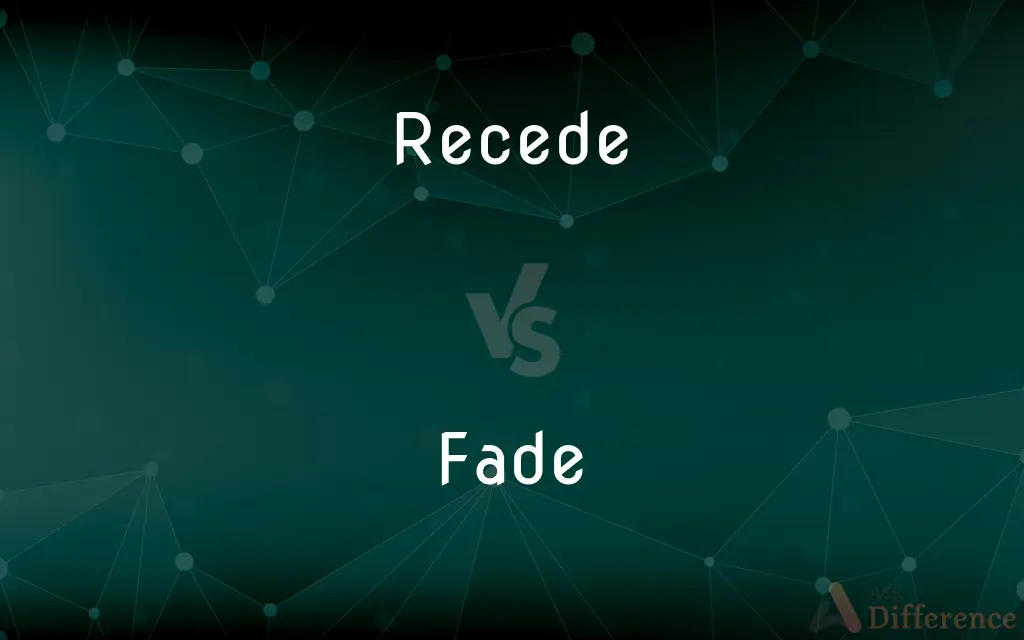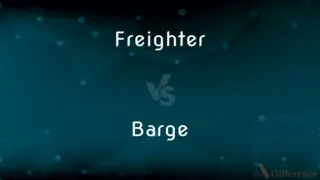Recede vs. Fade — What's the Difference?
By Maham Liaqat & Fiza Rafique — Updated on April 16, 2024
Recede refers to something moving backward or diminishing in prominence, while fade implies a gradual loss of brightness, clarity, or existence.

Difference Between Recede and Fade
Table of Contents
ADVERTISEMENT
Key Differences
"Recede" is typically used to describe something physically moving away or decreasing in amount, such as the sea receding from the shore. In contrast, "fade" often describes a gradual decrease in the intensity of color, sound, or presence, such as a sound fading into the distance.
When discussing time-related changes, "recede" implies a clear movement or retreat from a previous position, like memories receding over time. On the other hand, "fade" suggests a slow disappearance or diminishment, like an old photograph fading.
In the context of feelings or abstract concepts, "recede" can denote emotions or problems becoming less intense or prominent, whereas "fade" typically indicates a slow erosion of feelings or relevance, such as fading interest or enthusiasm.
Financial markets or economic indicators might "recede" indicating a retreat from peak values, while prices or demand might "fade," suggesting a gradual decline.
In literary or figurative language, to "recede" is to draw back or lessen significantly, often creating a strong visual of pulling back. In contrast, to "fade" is used to create a soft, gradual change, evoking a sense of slow disappearance.
ADVERTISEMENT
Comparison Chart
Meaning
Move back or diminish
Gradually lose brightness or presence
Usage
Physical or metaphorical retreat
Gradual decrease in intensity
Common Contexts
Water levels, memories
Colors, sounds, relevance
Implication
Often implies a noticeable change
Implies a subtle, gradual change
Figurative Use
Emotional or problem intensity
Interest, enthusiasm, visibility
Compare with Definitions
Recede
Move back or away from a limit, degree, point, or mark.
The floodwaters began to recede.
Fade
To lose brightness or color.
The curtains faded after years in the sun.
Recede
To diminish in intensity or extent.
His anger receded after a calming walk.
Fade
To become dimmer or less distinct.
The voices faded as she walked away.
Recede
To withdraw or retreat.
The crowd receded to give space to the performers.
Fade
To gradually disappear.
The ghostly apparition seemed to fade into the air.
Recede
To decline or decrease.
The echoes of the concert receded into silence.
Fade
To lose importance or relevance.
As the years passed, the old traditions faded.
Recede
To become more distant.
As the boat sailed away, the coastline receded.
Fade
To lose freshness, vigor, or strength.
His enthusiasm faded after several setbacks.
Recede
To move back or away from a limit, point, or mark
Waited for the floodwaters to recede.
Fade
To lose brightness, loudness, or brilliance gradually
The lights and music faded as we set sail from the harbor.
Recede
To slope away from a point of reference
A man with a chin that recedes.
Fade
To lose freshness; wither
Summer flowers that had faded.
Recede
To become or seem to become more distant and fainter or less distinct
Eventually, my unhappy memories of the place receded.
Fade
To lose strength or vitality; wane
Youthful energy that had faded over the years.
Recede
To decrease or diminish
Fuel prices will recede after the holiday.
Fade
To disappear gradually; vanish
A hope that faded.
Recede
To yield or grant to one formerly in possession; cede (something) back.
Fade
(Sports) To swerve from a straight course, especially in the direction of a slice.
Recede
To move back; to retreat; to withdraw.
Fade
(Football) To move back from the line of scrimmage. Used of a quarterback.
Recede
To cede back; to grant or yield again to a former possessor.
To recede conquered territory
Fade
To cause to lose brightness, freshness, or strength
Exposure to sunlight has faded the carpet.
Recede
To take back.
Fade
(Sports) To hit (a golf ball, for instance) with a moderate, usually controlled slice.
Recede
To move back; to retreat; to withdraw.
Like the hollow roarOf tides receding from the insulted shore.
All bodies moved circularly endeavor to recede from the center.
Fade
(Games) To meet the bet of (an opposing player) in dice.
Recede
To withdraw a claim or pretension; to desist; to relinquish what had been proposed or asserted; as, to recede from a demand or proposition.
Fade
The act of fading.
Recede
To cede back; to grant or yield again to a former possessor; as, to recede conquered territory.
Fade
A gradual dimming or increase in the brightness or loudness of a light source or audio signal.
Recede
Pull back or move away or backward;
The enemy withdrew
The limo pulled away from the curb
Fade
A transition in a cinematic work or slide presentation in which the image gradually appears on or disappears from a blank screen.
Recede
Move back and away from;
The enemy fell back
Fade
(Sports) A moderate, usually controlled slice, as in golf.
Recede
Retreat
Fade
A control mechanism on a stereo that adjusts the distribution of power between the front and rear channels.
Recede
Become faint or more distant;
The unhappy memories of her childhood receded as she grew older
Fade
A style of haircut in which the hair is cut close to the sides and back of the head and trimmed to result in gradually longer lengths toward the top of the head.
Fade
(archaic) Weak; insipid; tasteless.
Fade
(archaic) Strong; bold; doughty.
Fade
(golf) A golf shot that curves intentionally to the player's right (if they are right-handed) or to the left (if left-handed).
Fade
A haircut where the hair is short or shaved on the sides of the head and longer on top. See also high-top fade and low fade.
Fade
(slang) A fight.
Fade
A gradual decrease in the brightness of a shot or the volume of sound or music (as a means of cutting to a new scene or starting a new song).
Fade
(slang) The act of disappearing from a place so as not to be found; covert departure.
Fade
To hit the ball with the shot called a fade.
Fade
(intransitive) To grow weak; to lose strength; to decay; to perish gradually; to wither, as a plant.
Fade
(intransitive) To lose freshness, color, or brightness; to become faint in hue or tint; hence, to be wanting in color.
Fade
(intransitive) To sink away; to disappear gradually; to grow dim; to vanish.
The milkman's whistling faded into the distance.
Fade
(transitive) To cause to fade.
Fade
To bet against (someone).
Fade
Weak; insipid; tasteless; commonplace.
His masculine taste gave him a sense of something fade and ludicrous.
Fade
To become fade; to grow weak; to lose strength; to decay; to perish gradually; to wither, as a plant.
The earth mourneth and fadeth away.
Fade
To lose freshness, color, or brightness; to become faint in hue or tint; hence, to be wanting in color.
Fade
To sink away; to disappear gradually; to grow dim; to vanish.
The stars shall fade away.
He makes a swanlike end,Fading in music.
Fade
To cause to wither; to deprive of freshness or vigor; to wear away.
No winter could his laurels fade.
Fade
A golf shot that curves to the right for a right-handed golfer;
He took lessons to cure his slicing
Fade
Gradually ceasing to be visible
Fade
Become less clearly visible or distinguishable; disappear gradually or seemingly;
The scene begins to fade
The tree trunks are melting into the forest at dusk
Fade
Lose freshness, vigor, or vitality;
Her bloom was fading
Fade
Disappear gradually;
The pain eventually passed off
Fade
Become feeble;
The prisoner has be languishing for years in the dungeon
Common Curiosities
Can a color recede?
In a metaphorical sense, yes, it can imply moving into the background.
Can feelings fade or recede?
Feelings can both fade in intensity and recede in prominence or importance in one's life.
What does it mean for a sound to recede?
It means the sound is diminishing or moving away from the listener.
Is it correct to say a storm is receding if it's moving away?
Yes, this indicates the storm is diminishing in intensity or moving away from a specific area.
What's the difference between a song fading out and receding?
Fading out refers to gradually losing volume or presence, while receding isn't typically used in this context.
What happens when interest in a hobby fades?
It gradually loses its appeal or importance to the individual.
How do trends fade in society?
They slowly lose popularity or relevance over time.
When does a politician's power recede?
When their influence or authority diminishes or they lose their position.
How do memories fade and recede?
Memories fade in clarity and intensity, and they recede by becoming less prominent or frequent.
What does it mean for a disease to recede?
It means the disease is diminishing in severity or extent.
What does "the stars faded at dawn" imply?
It means the stars became less visible as the light increased.
Can a person fade into obscurity?
Yes, this refers to gradually losing fame or recognition and becoming less known.
Share Your Discovery

Previous Comparison
Freighter vs. Barge
Next Comparison
Lent vs. RamadanAuthor Spotlight
Written by
Maham LiaqatCo-written by
Fiza RafiqueFiza Rafique is a skilled content writer at AskDifference.com, where she meticulously refines and enhances written pieces. Drawing from her vast editorial expertise, Fiza ensures clarity, accuracy, and precision in every article. Passionate about language, she continually seeks to elevate the quality of content for readers worldwide.
















































